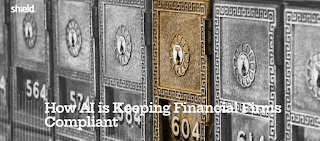How AI Is Working Effectively For Financial Compliance?
AI is making financial compliance and regulations cost-effective and easier than ever before by automating surveillance, Boosting the accuracy of noncompliance and regulatory change detection, preventing rule violations, and detecting financial crimes and market manipulation.
Due to Automated Surveillance in Artificial Intelligence non-compliance detection is improved. AI will save $1 trillion in financial institutions by 2030. This results in a 22 percent savings in operating costs. These cost savings are achieved because of AI integration with older compliance systems, which improves productivity while also lowering operational expenses. Today's AI-driven compliance platforms can acquire and convert these varied forms of inputs into relevant compliance-related data more precisely and at a faster rate than people, due to enhanced surveillance that can record electronic, visual, and audible data. Local financial companies like Maybank and DBS are creating their own AI-driven solutions to automate the surveillance of huge volumes of compliance-related data with major banks like HSBC and Standard Chartered. This helps to simplify compliance monitoring while also lowering the possibility of fraud and abuse going undetected.
Financial Compliance managers in the global financial industry must keep track of the number of regulatory changes that take place every day. Previously, this required teams of personnel to devote their time to combing through huge amounts of compliance change data and manually integrating relevant data into legacy compliance tracking systems. Now days Using the potential of AI-driven automation, however, today's regulated financial firms may improve the accuracy and efficiency of their regulatory change management processes. Top AI compliance platforms can solve the problems that come with this ineffective data to regulatory change management, especially when it comes to removing the millions of false alerts that clog up compliance management procedures across the industry.
Artificial intelligence is a significant tool for making compliance departments at financial institutions more efficient, but it also contributes to the detection of fraud. By tracking email and IP addresses and confirming that multiple accounts are not operated from them, AI-supported platforms can detect fraudulent staff who create fake accounts. Millions of discussions across numerous data types can be processed by AI-driven compliance platforms, which is where fraud and abuse commonly begin. AI can even be used to prevent illegal activity and monitor possible dangers to customers and employees by enhancing the effectiveness of financial compliance investigations.
Artificial intelligence compliance technology is already capable of extracting metadata, detecting entities that are referred to, and understanding the intent of every regulated activity carried out at a worldwide financial institution. As we come closer to totally automated compliance, AI has shown its utility in financial compliance and will continue to play a big part in financial institutions.




Comments
Post a Comment